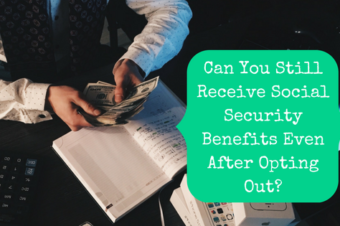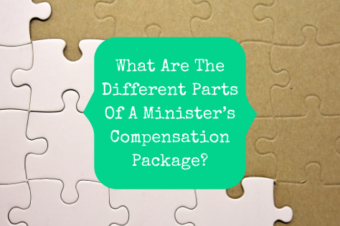
This is a guest post by Paul McWilliams, an independent financial advisor with Inspire Advisors who specializes in helping organizations set up and administer retirement plans. In addition to his technical knowledge, Paul is also a pastor’s kid! Paul can be reached for questions at paul.mcwilliams@inspireadvisors.com.
Retirement is a popular topic these days because most Americans are financially unprepared for it. Pastors and church employees are no different. While many workers have employer-sponsored 401(k)s to save into, a lot of pastors are left on their own. Over half of the churches in the country have less than 100 people in attendance each week, so many churches feel they are too small to sponsor a retirement plan for their pastor and staff.
I’m here to tell you that it’s not true. No matter how small your church is, there are ways for you to sponsor a retirement plan and it doesn’t even have to be a financial burden.
What Kinds of Retirement Plans are Available for Churches?
As both a church and an employer, churches can sponsor all kinds of retirement plans. They include 403(b)s, 401(k)s, SEP IRAs, SIMPLE IRAs, and even defined benefit pension plans. Each kind of plan has unique features and rules that apply to it.
One benefit that churches have is that they can choose whether they want to sponsor a plan that is subject to ERISA or not. ERISA stands for the Employee Retirement Income Security Act and is the legislation that governs most employee-sponsored retirement plans. ERISA has a lot of rules and requirements, which is why it can be a benefit for churches to be able to choose whether or not to be subject to it.
In my experience, a non-ERISA 403(b) is often the best choice for churches. A 403(b) is a lot like a 401(k) as far as tax benefits and contribution limits, but they don’t have to be subject to ERISA. Not being subject to ERISA makes things a lot simpler. You don’t have to file Form 5500 or complete nondiscrimination testing, which is a huge opportunity for cost savings in comparison with a “typical” employer-sponsored retirement plan, like a 401(k).
Before you start shopping for a retirement plan, you may want to check to see if your denomination or association of churches already has one that your pastor and staff can participate in. However, you should also know that just because they do, that doesn’t mean it’s the best option. You may still want to sponsor your own. My dad’s denomination offers a plan, but his church still decided to sponsor their own.
What Features Should a Church Look for in a Retirement Plan?
One of the best features of a non-ERISA plan is the fact that you can favor certain employees, or discriminate. For example, let’s look at a church that has one pastor and a couple of regular full-time employees that are not pastors. The church could make the same employer contributions to each person’s account or they could offer the pastor one amount and the other employees a different amount (or even nothing). For churches who want to help their pastor but can’t afford to do as much for their staff as well, this is a great opportunity.
I have seen churches address this in a variety of different ways. Some churches match up to 6% while others do not. Some don’t do matching contributions but rather contribute a fixed amount. Some contribute only for their pastor while others make contributions for all employees. It really is that flexible.
Other beneficial retirement plan features that are often overlooked are the available contribution types. You can offer both pre-tax and post-tax (Roth) employee contributions. Employers can offer matching contributions and discretionary contributions. When I design plans for my clients, I like to make them as flexible as possible with a wide range of options.
With contribution limits much higher than individual IRA limits, having a church-sponsored plan can be a real blessing for pastors and also gives churches more flexibility in how they compensate their staff.
Considerations When Choosing a Retirement Plan
There are a number of different things you should take into consideration when choosing a retirement plan. One is how financially “healthy” a church is. You don’t want to promise matching contributions if you may not have the cash flow to make them. Still, you can design the plan so that employer contributions are “discretionary” so that you are not locked into a requirement to match or contribute as an employer.
In my experience, when you have an open conversation with the church board and key members about the need for staff benefits like a retirement plan for pastors, they are “normally” 100% supportive. They want to make it happen for the benefit of their pastor that leads them. Pastors who want their church to sponsor a retirement plan often have me come in and present to the decision-makers so that I can explain how it all works and answer any questions they may have.
Cost is an important consideration, but the decision should not be based on cost alone. While SEP IRAs or SIMPLE IRAs may cost less, they are often not optimal. Increased contribution limits and flexibility are often worth the increased cost. One thing that affects the cost is whether the plan has a plan document or a third-party administrator. Some plans require a plan document (such as a 403(b)(9) church plan) while others do not (like a 403(b)(7) plan). That being said, plan documents are helpful even if they are not required by law. Among the church plans I have helped set up, some have a plan document and third-party administrator and others have neither.
Another thing to consider is who on your staff is going to manage everything? A lot of retirement plan responsibilities can be outsourced but there is always a cost to that. Alternatively, a board member or church member who is not on staff could also help with the administration. Where there is the most opportunity for error is in depositing money and making sure that the employees’ salary deferrals get into the plan properly and in a timely manner.
How Pastors Can Claim a Housing Allowance in Retirement
One of the greatest benefits for pastors, besides being able to save more money in a tax-advantaged manner, is being able to claim a housing allowance in retirement. The minister’s housing allowance can only be given as compensation for ministerial services. However, if you wait until retirement to receive that compensation, it is still from ministerial services and therefore eligible for the housing allowance.
The key to claiming a housing allowance in retirement is that it must come from a church (or other housing allowance eligible organization)-sponsored retirement plan. Even if your IRA account was built with money you earned as a pastor, you won’t be able to claim a housing allowance from an IRA. It has to be from a church plan. For that reason, it’s extra helpful for a pastor when the church is willing to sponsor a plan. It also means that pastors should be careful not to roll all of their money into an IRA in retirement.
This article is for informational purposes only and is not legal, investment, or tax advice. Consult your CPA or legal counsel when establishing a retirement plan and make sure to follow all IRS guidelines.




14 Responses
Rick Huff
June 22, 2021Excellent article.
Great reminder/admonition about NOT rolling over retirement plan monies into one’s IRA.
Amy
June 22, 2021Thank you, Rick. I’m glad you enjoyed it.
David Rutledge
September 3, 2021For a Interim minister – 10 months would he get a W-2 or a 1099 form
I have read IRS 20 questions, Weber case and some other and it seems like a W-2 would be issued.
If he gets a 1099 -Files Schedule C, has housing allowance from the church, does he not lose some of his ministry expenses with the IRS Sec 265 -Deason – disallowance regulation if he puts the ministry expenses on Schedule C? If he had a W-2 and the church reimbursed for the ministry expenses, all of them expenses in a sense would be deducted/paid for
Amy
September 10, 2021David, whether the minister would be paid with a W-2 or 1099 is beyond my expertise. I would recommend you consult a CPA or see if Vickey at freechurchaccounting.com may be able to help you.
David Rutledge
September 11, 2021THANK YOU
David Rutledge
September 14, 2021In talking with denomination retirement plan people, they say that in order to have Housing Allowance from a retirement account that the account must be a 403(b)(9) – not just a 403(b) – that is what the IRS code indicates
Now I am confussed
Amy
September 15, 2021David, your confusion is understandable. There is not a lot of guidance on this issue and the IRS actually refuses to issue guidance on it as well. The reason people say you can only claim a housing allowance from a 403(b)(9) plan is because the IRS has said that it is indeed allowed. They haven’t specifically addressed any other kinds of plans, either positively or negatively. The only guidance they have provided is that the same rules apply during retirement as during your working years- that it must be designated by the church ahead of time, given as compensation for ministerial services, and cannot exceed the stated limits. I believe that you can reasonably argue that other kinds of plans can meet the requirements to offer a housing allowance, but most people shy away from that because it is not specifically addressed by the IRS. Unfortunately, it looks like this will be a gray area in the law for the foreseeable future.
Ethan
April 22, 2022For non-denominational church ministers, do you set up new 403b account if you switch churches, or does the 403b account follow you to your new church?
Amy
April 24, 2022The new church would need to set up a new 403(b). If they do, you can usually roll your old 403(b) balance into the new account if you would like. Otherwise, you can leave the funds in the old 403(b), you just cannot make any more contributions when you’re no longer working for that church.
Rick
December 15, 2022Trying to find a fund company that will open a 403(b)(9). Do you know of any?
Andy
August 12, 2023How is a church defined? Would a mission organization with 2 employees, ordained minister and one other, be able to open a 403(b)?
Amy
September 8, 2023Yes, any non profit can open a 403(b), they are not specific to churches. Whether a pastor could claim a housing allowance from the 403(b) funds depends on if they are compensation for “ministerial services” provided by the pastor.
Rutledge David
August 13, 2023I would suggest if there is a denomination involved talk to them. If not contact Guidestone